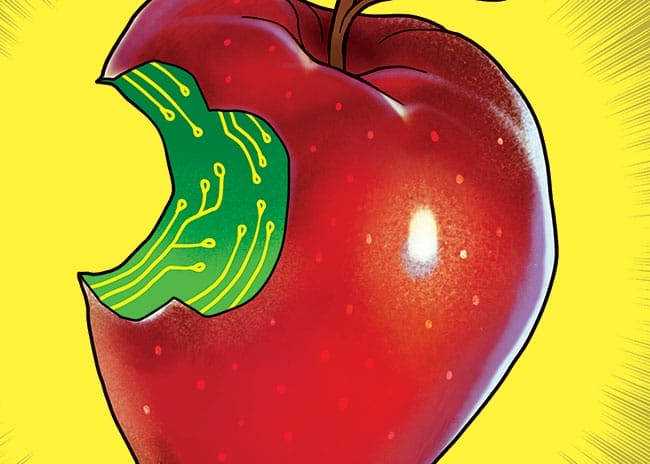There are many myths surrounding the millennial generation. They are lazy, they are self-absorbed, they are jobless. All of these statements are crude generalizations. However, one of the greatest millennial myths is that millennials are the besteducated generation in history. While it is true that more millennials have attended college than any other generation, other weaknesses in our educational system have flattened out the overall performance of the cohort.
According to research conducted by the Organization for Co-Operation and the McKinsey Global Analysis Institute, only 41 percent of Americans age 25 to 34 have tertiary education. This number is identical to the rate of the leading edge of the boomer population.
What does this mean for educators today?
Something must change if we want to see an increase in the amount of young adults choosing to undergo secondary education. Millennials are an entirely new breed of students who require significantly more feedback, interaction and technology to feel motivated and empowered in the classroom. That change will come from the millennials themselves. Their generation will disrupt, reinvent and ultimately save the faltering education system.
The millennial influence is already largely apparent through the incorporation of technology and interactive materials into the classroom. Millennials believe that the utilization of tech has extremely positive effects on them as students, and they often feel more prepared for their post-ed lives if technology was used throughout their schooling. As a result, smart boards, tablets and interactive textbooks are being utilized in the classroom as educators are adapting to a new set of expectations. A recent study of 1,345 students conducted by Millennial Branding and Internships.com found that 84 percent of students use a computer to take notes in the classroom and 19 percent use an iPhone or tablet device to study.
Millennials are even reimagining how education can be acquired. These students see education as an evolving system and expect more rapid digitization and innovation in the classroom. Standard lectures and traditional tests do not fly with millennials. They want constant feedback and involvement and expect their professors to respond to questions via texting and email. The formal learning environment that was once the foundation of the classroom is now evolving into an informal group-based learning space. Virtual classrooms and online colleges are becoming increasingly popular among this generation. The Millennial Branding and Interships.com study also found that 50 percent of students do not need a physical classroom to learn. Beyond that, 39 percent of respondents view the future of education being more virtual.
For boomers, the concept of online education doesn’t carry much validity, but millennials are digital natives and many are now also mobile natives. Those who are still students were born in the early ’90s—meaning, many have no frame of reference for what life was like before the Internet or their smartphones.
One in four millennials in the United States are stepping into a new role—as parents—and are also voicing their opinions about the future of education from that perspective. Through research with my firm FutureCast in conjunction with marketing and media agency Consumer Orbit, I have attempted to better understand the millennial parent demographic by slicing them into five segments: Image First, Family First, Under Stress, Style and Substance, and Against the Grain. The research shows that millennial parents are more conservative than many think. While seemingly contradictory to previous millennial studies, we found that millennials do not equate the word “conservative” to a political definition. Instead, they use it to define a shift in attitude regarding spending, commitment to the Internet and social beliefs. This new conservatism is also reflected in the types of education millennial parents seek for their families.
Millennial parents are looking for a more individualized education for their children. They want smaller classrooms and more one-on-one interactions between the teachers and the students. They also expect their children to be tech-savvy and want to incorporate that technology into their educational experiences at home. Online sites are becoming prime tools used by young parents. One of these popular platforms is StoryBots. Like Sesame Street, StoryBots has created a world of unique creatures, which provides personalized educational entertainment for children. The StoryBots experience can be customized for any child through the “Starring You” books and videos, leveraging the technology created by Jib Jab (the firm that designed the dancing elves personalized Christmas cards and was co-founded by Greg Spiridellis WG99) to add a child’s picture to animated storybooks and music videos. Children and parents are able to watch themselves be featured in educational videos on topics ranging from the ABCs to outer space.
Currently, millennials control nearly $1.3 billion in discretionary spending and are leaving their mark not just on the consumer market, but also in all aspects of our country’s ecosystem—specifically, the way our nation views and embraces education. The future of education is unclear. What is certain is that it will look very different from what we have experienced over the past decade. At the rate our digital culture is evolving, those in the education system must expect even more transformation in the near term as a result of the millennial influence and their innovative mindset. These young adults are not just the current students who are directing this mindset shift, but they are also the parents of future students.
Jeff Fromm W87 is a marketing strategy consultant, author and speaker about millennial trends and a regular Forbes contributor. He has 25+ years of hands-on experience with brands. Follow Jeff on Twitter at @JeffFromm, or reach him directly at jfromm@thefuturecast.com. He is also a regular contributor on the Wharton Blog Network.


























